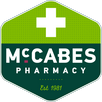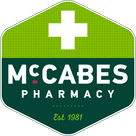Face masks for acne
Acne is a skin condition that affects most people during their teenage years or young adulthood. While methods for treating it depend on how serious it is, one way to lessen the symptoms is by applying a soothing mask.
On this page, we explain the different types of acne and what causes the condition, and tell you how to use face masks as part of a daily and weekly face-cleaning routine.
Click on a link below to jump to that section:
- Acne
- Face masks for acne
- Frequently asked questions
Acne
Acne is a very common skin condition, affecting around 95% of teenagers and young adults.People who suffer with chronic acne tend to experience quite severe spots and oily,painful or tender skin, usually on the:
- face
- back and shoulders
- chest
The conditioncan recur for several years before the symptoms improve and eventually disappear.
Causes of acne
Acne develops when hair follicles clog.
The human body has millions of these follicles, and a hair grows out of each one. Attached to every follicle is a sebaceous gland, which produces a natural oil (called sebum) that stops the hair losing moisture and drying out.
When you have acne, your sebaceous glands produce too much sebum. The sebum mixes with dead skin cells and gets into your follicles, causing a blockage. The blockage pushes to the skin’s surface and forms as a spot known as a comedone.
Comedones can be open or closed, and cause different types of acne spots as a result. We look at these different types below.
Types of acne

Blackheads
‘Open comedones’. Blocked follicles that move to the surface of the skin and darken through being exposed to oxygen.
Read more about acne blackheads here

Whiteheads
‘Closed comedones’. Because they don’t open up and oxidise in the air, they retain their white colour. These spots can also be quite firm.
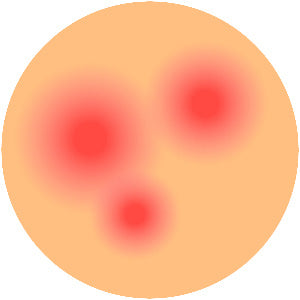
Papules
A type of pimple, these bumps are small and redin appearance and firm to the touch. They contain no pus but can feel sore and tender.

Pustules
Small white pimples on the skin’s surface that contain pus. Theskin around them is often red and inflamed, and the spots themselves can be hard and sore.
Pustules generally contain pus because the pore has become infected.
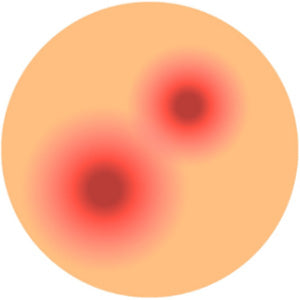
Nodules/cysts
Hard lesions that form deep beneath the skin as a result of a bacterial infection. They can be swollen and very sore to the touch and give you a very red skin tone.
Nodules are fairly small and don’t contain any pus, while cysts are like large, pus-filled boils.
Nodular and cystic acne are considered the more severe forms of the condition.
Who acne affects
Acne is extremely common in teenagers and young people who are going through puberty. At this age, the body increases its production of hormones, particularly testosterone, which is said to make the sebaceous glands generate more sebum. This excess oil is what causes acne to develop.
The following people are also more likely to be affected by acne:
- Children whose parents suffered with the condition
- Women who are pregnant or menstruating
- People who take medication such as corticosteroids, lithium or androgens
- People who use cosmetics that contain oil
Most acne sufferers have a recurring condition until they reach their mid-20s, at which point the symptoms generally lessen in severity and disappear.
Adult acne
While acne is most common among teenagers and young adults, the condition can remain throughout a person's life, or flare up intermittently.
Acne occurs when the sebaceous glands produces too much sebum, and this goes on to clog hair follicles. Teenage hormones are usually responsible for this over-production, but they are not the only cause. Hormonal changes brought about by pregnancy, or even menstruation, can lead to sebum production and eventually, acne.
Other causes include:
- Smoking
- Birth control pills
- Stress
However, the above causes do not guarantee that a person will experience adult acne. Genetics also play a part. If a parent suffers with adult acne, this will mean the above triggers are more likely to lead to sebum over-production in their children.
Face masks to reduce acne
Skincare routine
While there's nothing to say that having unclean skin can cause acne to develop, using a face mask as part of a dedicated skincare routine can counter the build-up of excess sebum and help lessen the effects of acne spots.
Your daily and weekly skincare regime should include the following steps:
- Cleansing
- Exfoliating
- Applying a face mask
Cleansing your face
Washing your face both in the morning and at night removes excess oil and gently exfoliates the surface of the skin.
However, take care not to overdo it! Cleansing your face more than twice a day can aggravate the symptoms of acne rather than ease them.
Dos and don'ts
DO:
- Use a water-soluble, oil-free cleanser
- Check that the product won't irritate your skin
- Use lukewarm water
DON'T:
- Use:
- Oil-based products
- Thick lotions or creams (these clog your pores)
- Products that contain irritants such as alcohol, eucalyptus, lemon or peppermint
Exfoliating your face
Removing dead skin from your face helps to lessen acne’s effects. Use a face scrub up to three times a week, but no more. You don’t want to get rid of all of your skin’s natural oil, as it has some benefits too.
After exfoliation, you can apply a face serum to soothe and soften the skin, then a moisturiser to provide hydration.
Dos and don’ts
DO:
- Use products that contain salicylic acid—this ingredient gets deep into the various layers of the skin and dissolves dead cells
DON’T:
- Scrub your face with too much force—this can inflame and irritate your skin
Applying a face mask
Put on a face mask once each week to remove dirt, bacteria, impurities and excess oil from your skin. As face masks work better on clean skin, cleanse and exfoliate your face before applying the mask evenly, especially across your nose, forehead and chin.
Most face masks dry in between five and 10 minutes. It's normal for this to make your skin feel slightly tight or itchy.
When peeling off the mask, begin at the chin and peel slowly upwards. If you only applied the mask to your nose and forehead, peel from the sides of your nose.
Apply a gentle moisturiser that won't block your pores.
Dos and don’ts
DO:
- Follow the instructions that come with the product
- Wash off the mask if your skin starts to feel painful or very uncomfortable
DON’T:
- Use any face mask without first checking whether you’re allergic or sensitive to the ingredients—put a small amount on your skin and wait 10 minutes to test for a bad reaction
Our recommended face masks for acne
 |
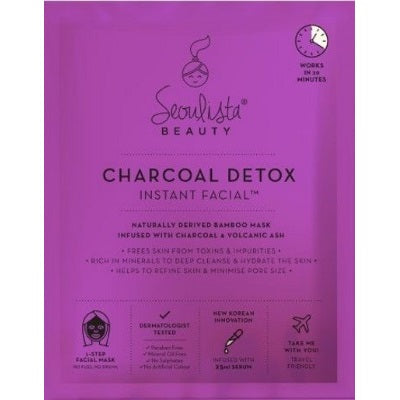 |
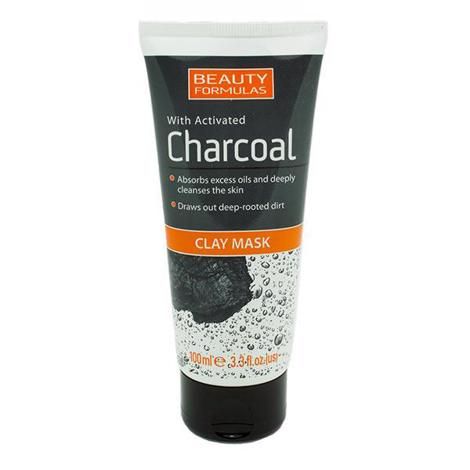 |
|
The Inkey List Kaolin Clay Mask 50ml
|
Seoulista Charcoal Detox Instant Facial
|
Beauty Formulas Charcoal Clay Mask 100ml
|
|
Price: €6.99 |
Price: €6.99 |
Price: €1.99 |
 |
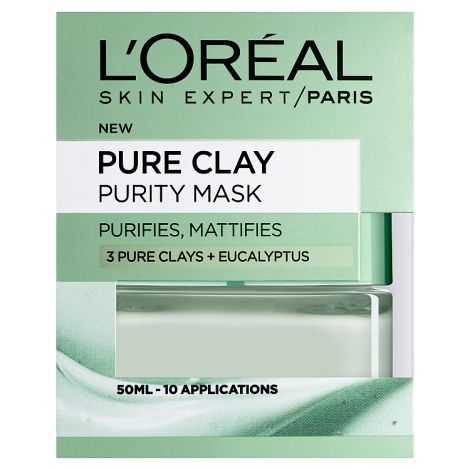 |
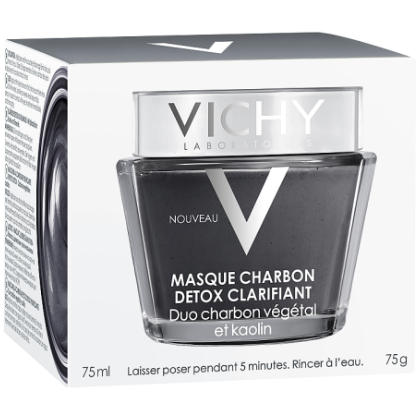 |
|
Vichy Normaderm 3-in-1 Cleansing + Scrub + Mask 125ml
|
L'Oreal Paris Pure Clay Purity Mask 50ml
|
Vichy Clarifying Detox Charcoal Mask 75ml
|
|
Price: €14.00 |
Price: €12.00 |
Price: €18.00 |

The Inkey List Kaolin Clay Mask 50ml
- Kaolin and smectite clay to remove impurities and unclog pores
- Non-drying
- Suitable for all skin types
- Paraben-free, fragrance-free and cruelty-free
Price: €7.50

Seoulista Charcoal Detox Instant Facial
- Frees skin from toxins and impurities
- Rich in minerals
- Dermatologist-tested
- Free of parabens, sulphates and artificial colours
Price: €9.49

L'Oreal Paris Pure Clay Detox Mask 50ml
- Deep pore cleansing
- Results in just 5 minutes
- Mineralising thermal water invigorates the skin
- 100% hypoallergenic
- Tested on sensitive skin
Price: €18.00

Vichy Normaderm 3-in-1 Cleansing + Scrub + Mask 125ml
- Deep pore cleansing
- Results in just 5 minutes
- Mineralising thermal water invigorates the skin
- 100% hypoallergenic
- Tested on sensitive skin
Price: €18.00

L'Oreal Paris Pure Clay Purity Mask 50ml
- Kaolin and bentonite clay to absorb oils
- Tested on sensitive skin
- Hypoallergenic
- Paraben-free
Price: €12.00

Vichy Clarifying Detox Charcoal Mask 75ml
- Deep pore cleansing
- Results in just 5 minutes
- Mineralising thermal water invigorates the skin
- 100% hypoallergenic
- Tested on sensitive skin
Price: €18.00
Frequently asked questions
Do face masks make acne worse?
They can if the ingredients in the product aren’t suitable for your skin type (if your skin is particularly sensitive, for example). Ingredients such as alcohol, eucalyptus, lemon and peppermint can actually cause inflammation or irritation rather than soothe your skin and relieve the effects of acne.
If you want to use face masks but aren’t sure about which ingredients are right for your skin, it’s worth consulting your GP or a dermatologist.
Also bear in mind that applying face masks too liberally or often can have adverse effects, so try to limit your use of face masks to once a week.
What are the best face masks for acne?
Ideally, you should use a peel-off mask. Unlike sheet masks, peel-off masks don’t clog your pores as much—which can worsen breakouts of acne rather than combat them—and have an extra-beneficial exfoliating effect.
Also, look for masks with ingredients such as clay or activated charcoal, as these are excellent at drawing impurities, oil and bacteria from the skin and getting rid of blackheads and other types of acne spots.
Do face masks clear up pimples?
Face masks that are designed purposely to treat acne do generally have the effect of reducing the size of existing pimples while helping to prevent breakouts in the future.
What's the best time to apply an acne face mask?
Face masks work far more effectively on clean skin, so the best time to apply one is immediately after you’ve washed and exfoliated your face. Assuming you do this in the morning and before you go to bed, the most convenient time to apply the mask would be in the evening.
